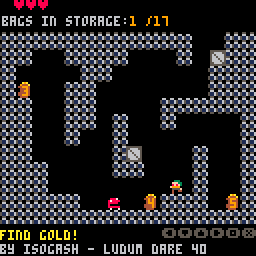Hi game devs that are reading this blog!
We want to share here a very good and useful document! It's the template of a Game design document (GDD) used by Devs to show their Games and their features. It is a highly descriptive living design document of the design for a video game.
A game design document may be made of text, images, diagrams, concept art, or any applicable media to better illustrate design decisions. Some design documents may include functional prototypes or a chosen game engine for some sections of the game.
Here it's an example or better, a template, to use to describe your own game. It's made and share by Benjamin “HeadClot” Stanley.
<Your Game Name Here>
<Your
Company Logo Here>
Revision:
0.0.0
Overview
Theme / Setting / Genre
-
<Insert Theme here>
Core Gameplay Mechanics Brief
-
<Gameplay Mechanic #1>
-
<Gameplay Mechanic #2>
-
<Gameplay Mechanic #3>
-
<Gameplay Mechanic #4>
Targeted platforms
-
<Example Platform #1 Here>
-
<Example Platform #2 Here>
-
<Example Platform #3 Here>
Monetization model (Brief/Document)
-
<Monetization Type> (Premium, Paid Alpha/Beta/Final, Ad Driven,
Micro-transactions, Subscription, etc.)
- <Link
to Monetization Document>
(How do you
plan to monetize the game?)
Project Scope
-
<Game Time Scale>
-
Cost? (How much will it cost?)
- Time Scale (How long will it take to make this game?)
- <Team Size>
- <Core Team>
- Team Member name?
- What does he/she
do?
- <Cost to employ
them full time or part time>
- etc.
(List as many
core team members as you need to)
- <Marketing Team>
- Team Member name?
- What does he/she
do?
- <Cost to employ
them full time or part time>
- Etc.
(List as many
marketing team members as you need to)
- <Licenses /
Hardware / Other Costs>
- <Total Costs
with breakdown>
Influences (Brief)
- <Influence #1>
-
<Medium> (Television, Games, Literature, Movies, etc.)
- /Explain why this is an influence in 1 Paragraph or less/
- <Influence #2>
-
<Medium> (Television, Games, Literature, Movies, etc.)
-
/Explain Why in 1 Paragraph or less/
- /Explain why this is an influence in 1 Paragraph or less/
- <Influence #3>
-
<Medium> (Television, Games, Literature, Movies, etc.)
- /Explain why this is an influence in 1 Paragraph or less/
- <Influence #4>
-
<Medium> (Television, Games, Literature, Movies, etc.)
-
/Explain Why in 1 Paragraph or less/
- /Explain why this is an influence in 1 Paragraph or less/
The elevator Pitch
<A one sentence pitch for your game.>
Pretend that your were pitching your game to a
executive going to the elevator. You have less than 60 Seconds.
Project Description (Brief):
<Two Paragraphs at least>
<No more than three paragraphs>
Project Description (Detailed)
<Four Paragraphs or more If needs be>
<No more than six paragraphs>
What sets this project apart?
-
<Reason #1>
-
<Reason #2>
-
<Reason #3>
-
<Reason #4>
-
<etc.>
Core Gameplay Mechanics (Detailed)
- <Core Gameplay Mechanic #1>
-
<Details>
/Describe
in 2 Paragraphs or less/
-
<How it works>
/Describe
in 2 Paragraphs or less/
- <Core Gameplay Mechanic #2>
-
<Details>
/Describe
in 2 Paragraphs or less/
-
<How it works>
/Describe
in 2 Paragraphs or less/
- <Core Gameplay Mechanic #3>
-
<Details>
/Describe
in 2 Paragraphs or less/
-
<How it works>
/Describe
in 2 Paragraphs or less/
- <Core Gameplay Mechanic #4>
-
<Details>
/Describe
in 2 Paragraphs or less/
-
<How it works>
/Describe
in 2 Paragraphs or less/
Story and Gameplay
Story (Brief)
<The Summary or TL;DR version of below>
Story (Detailed)
<Go into as much detail as needs be>
<Spare no
detail>
<Use Mind Mapping software to get your point
across>
Gameplay (Brief)
<The Summary version of below>
Gameplay (Detailed)
<Go into as much detail as needs be>
<Spare no
detail>
<Combine this with the game mechanics section
above>
Assets Needed
- 2D
- Textures
- Environment Textures
- Heightmap data
(If applicable)
- List required data required - Example: DEM data of the
entire UK.
- Etc.
- 3D
- Characters List
-
Character #1
-
Character #2
-
Character #3
-
etc.
- Environmental
Art Lists
-
Example #1
-
Example #2
-
Example #3
-
etc.
- Sound
- Sound List
(Ambient)
-
Outside
-
Level 1
-
Level 2
-
Level 3
-
etc.
-
Inside
-
Level 1
-
Level 2
-
Level 3
-
etc.
- Sound List (Player)
-
Character Movement Sound List
-
Example 1
-
Example 2
- etc.
-
Character Hit / Collision Sound list
- Example 1
-
Example 2
- etc.
-
Character on Injured / Death sound list
-
Example 1
-
Example 2
-
etc.
- Code
- Character
Scripts (Player Pawn/Player Controller)
- Ambient Scripts
(Runs in the background)
- Example
- NPC Scripts
- Example
- etc.
- Animation
- Environment
Animations
-
Example
-
etc.
- Character
Animations
-
Player
- Example
- etc.
- NPC
-
Example
-
etc.
Schedule
- <Object #1>
-
Time Scale
-
Milestone 1
-
Milestone 2
-
Etc.
- <Object #2>
-
Time Scale
-
Milestone 1
-
Milestone 2
-
Etc.
- <Object #3>
-
Time Scale
-
Milestone 1
-
Milestone 2
-
Etc.
- <Object #4>
-
Time Scale
-
Milestone 1
-
Milestone 2
-
Etc.

























